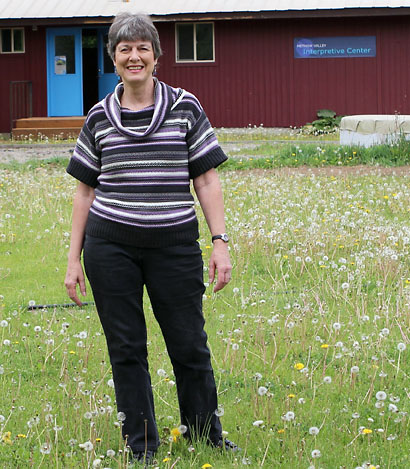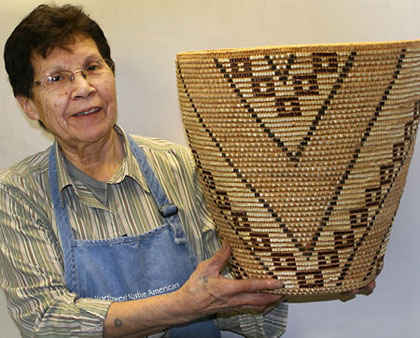home | internet service | web design | business directory | bulletin board | advertise | events calendar | contact | weather | cams

|
Original Inhabitants
A celebration of the history and culture of the Methow Valley’s original inhabitants is scheduled for June 9 and 10 when the new Methow Valley Interpretive Center opens at TwispWorks, the former U.S. Forest Service compound. Descendants of the Methow Indians will help dedicate the center and make presentations on June 9. The center’s theme is “Unlocking the Mysteries of the Methow Valley.” On opening day, the mysteries to be unlocked are the history and culture of the valley’s original inhabitants.  Carolyn Schmekel, executive director of the Methow Valley Interpretive Center, in front of the newly painted and renovated building. Carolyn Schmekel, executive director of the Methow Valley Interpretive Center, in front of the newly painted and renovated building.
Methow descendant Spencer Martin will conduct the opening ceremony at 10 a.m. and share information on native traditions at 2 p.m. Methow descendant Elaine Timentwa Emerson, a basket weaver who has recorded the Methow language, and her sister, Tillie Timentwa Gorr, a beadwork artist, will give presentations the same day. Emerson, who has given the center copies of more than 700 old family photographs, will give a presentation on the Methow’s native language at 1 p.m. and on basket weaving at 3 p.m. Gorr will share their family’s history at 11 a.m. and demonstrate native beadwork at 4 p.m. The center is an outgrowth of 15 years of “bridge building” by local whites and Methow Indian descendants, said executive director Carolyn Schmekel. “You can’t give back the land. You can’t make it just. But you certainly can acknowledge” what the Methow people experienced, Schmekel told Grist. The section devoted to telling their story “is the heart” of the center, she said. After the Methow Valley opened to white settlement in 1886, the Methow, who in Emerson’s words used the valley as “a breadbasket,” over time disappeared from the valley. According to some oral tribal accounts, they were forcibly driven out. Today the Methow people are part of the Confederated Tribes of the Colville Reservation. On June 10, herbalist Rosalee de la Foret will give a presentation on “Edible Plants of the Methow” at 12:30 p.m.. Naturalist and author Jack Nisbett will speak at 2 p.m. and lead a short hike at 4 p.m. Housed in a remodeled three-bedroom former Forest Service staff residence, the center will also offer displays and information about the valley’s geology and watershed, said Schmekel, and there will be informational displays about the valley’s plants and birds. The center’s tribal section will include video interviews with Methow descendants, and native handiwork will be sold in the center’s bookstore.  Methow descendant Elaine Timentwa Emerson will give presentations on the Methow language and traditional basket weaving at the opening. Methow descendant Elaine Timentwa Emerson will give presentations on the Methow language and traditional basket weaving at the opening.
Plans are afoot to build a half-sized (10-foot wide) native pit house, Schmekel added, “and we’re going to hold an encampment.” Tribal members will take the lead on those projects, she said, adding that they’d like a place where they can show their grandchildren what life was like here for their ancestors. The “Heart of the Methow Pow Wow” also will come under the center’s umbrella, she said. The 10th annual pow wow will be held this August in Twisp Park. The center, staffed by volunteers, received $7,000 in donations, including grants from the Icicle Fund and the Methow Community Fund, to gut and renovate the building - only one interior wall and the original red oak floors remain - said Schmekel, adding that her husband, Glenn, the center’s president, did most of the renovation with a team of volunteers. Other board members are Pearl Cherrington, vice president; Paula Macrow, treasurer; Jim Brennan, secretary, and Donna Keyser, director of exhibits. Carolyn Schmekel, who has overseen the renovation, opened Okanogan County’s first home design business, Harmony House Interiors, in 1986, initially above the Merc hardware store, and ran it for 24 years. “We are out of money,” Schmekel said, so fund-raising will begin to build the $15,000 annual operating budget needed to sustain the operation. “We definitely need local help to keep it open,” - donors, volunteers and docents, she said. The center so far has signed up 95 members; memberships cost $25 per person and $45 per family. For now, the center pays $300 rent per month to TwispWorks but that is expected to increase. Admission is free and donations are welcome. The center will be open on weekends only from 10 a.m. to 5 p.m. on Saturdays and noon to 5 p.m. on Sundays. It will offer monthly programs focused on subjects such as “Cats of the Methow” (November) and “How the Valley Formed and Reformed” (February). Details can be found at www.methowvalleyinterpretivecenter.com 6/4/2012 Comments How wonderful and most appropriate that the new Center will have Elaine Timentwa Emerson as an active participant. I have known Elaine for years and have treasured greatly her friendship and knowledge. I'm sure the Methow community will love her as I do. Jill Sabella Old Snowmass, Colorado
|
